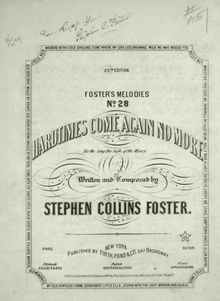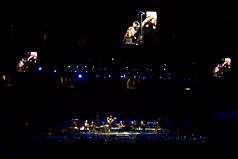Hard Times Come Again No More

"Hard Times Come Again No More" (de còps "Hard Times") ("Los maltempses tòrnan pas pus"), es una cançon de salon americana escricha per Stephen Foster. Foguèt publicada a Nòva York per Firth, Pond & Co. en 1854 jol nom de Foster's Melodies No. 28. Coneguda e populara a l'epòca[1], en America e en Euròpa[2][3], la cançon demanda als astrucs de considerar lo sòrt dels mens fortunats e se termina per un dels imatges preferits de Foster: "una domaisèla palla tombanta."
Le primièr enregistrament audio foguèt un cilindre de cera per l'Edison Manufacturing Company (Edison Gold Moulded 9120) en 1905. Foguèt enregistrat e jogat de nombroses còps despuèi. Lo cançon es referenciada #2659 al Roud Folk Song Index.
Una version satirica subre lo minjar dels soldats èra populara dins la Guèrra Civila Americana, "Hard Tack Come Again No More."
Paraulas[modificar | Modificar lo còdi]

Let us pause in life's pleasures and count its many tears,
While we all sup sorrow with the poor;
There's a song that will linger forever in our ears;
Oh! Hard times come again no more.
Repic:
'Tis the song, the sigh of the weary,
Hard Times, hard times, come again no more.
Many days you have lingered around my cabin door;
Oh! Hard times come again no more.
While we seek mirth and beauty and music light and gay,
There are frail forms fainting at the door;
Though their voices are silent, their pleading looks will say
Oh! Hard times come again no more.
Repic
There's a pale drooping maiden who toils her life away,
With a worn heart whose better days are o'er:
Though her voice would be merry, 'tis sighing all the day,
Oh! Hard times come again no more.
Repic
'Tis a sigh that is wafted across the troubled wave,
'Tis a wail that is heard upon the shore
'Tis a dirge that is murmured around the lowly grave
Oh! Hard times come again no more.
Repic
Interpretacions[modificar | Modificar lo còdi]
Dempuèi sa creacion, la cançon foguèt represa e interpretada per nombroses grand artistas americans entre los quals podèm citar:

- Dolly Parton dobriguèt sa cançon de 1980 "Hush-A-Bye Hard Times" per una version a cappella de Hard Times Come Again No More.
- Emmylou Harris dins l'album en public de 1992 live At the Ryman.
- Bob Dylan dins l'album de 1992 Good as I Been to You.
- Johnny Cash sul disc Redemption Songs en 2003 e dins l'album Unearthed
- Bruce Springsteen en 2009 sus Working on a Dream Tour
Ligams extèrnes[modificar | Modificar lo còdi]
- "Hard Times Come Again No More", Edison Male Quartette (Edison Gold Moulded 9120, 1905)—Cylinder Preservation and Digitization Project.
- "Hard Times Come Again No More" at the Vaughan Williams Memorial Library
Nòtas e referéncias[modificar | Modificar lo còdi]
- (en) Aqueste article es parcialament o en totalitat eissit d’una traduccion de l’article de Wikipèdia en anglés intitolat « Hard Times Come Again No More ».
- ↑ R.J. "The Fields of June". Southern Literary Messenger Vol. XXI No.8 (August 1855) Richmond, Va., p. 503: "Among these may be mentioned that sad plaintive beautiful melody of Foster's—'Hard times come again no more.' Have you heard it? What an echo of sadness in it! - :'Tis the song the sigh of the weary— - :Hard time! hard times! - :Many days you have lingered - :Around my cabin door, - :But hard times come again no more!"
- ↑ Sandford, Henry, Mrs. The Girls' Reading-Book. London: W. & R. Chambers (1876), p. 201: "It was in a sewing-school in Lancashire, during the latter part of the Cotton Famine, that the well-known song 'Hard times, hard time, come again no more!' first became familiar to my ears."
- ↑ Hubbard, W.L. (ed.). History of American Music. New York: Irving Squire (1908), p. 80: "Other songs beside those designated as plantation melodies, but all more or less impregnated with sentiment, now came rapidly from his pen and obtained a wide popularity not only in America but in Europe as well. Such songs as ..."Hard Times Come Again No More,"... have become familiar to many nationalities."
